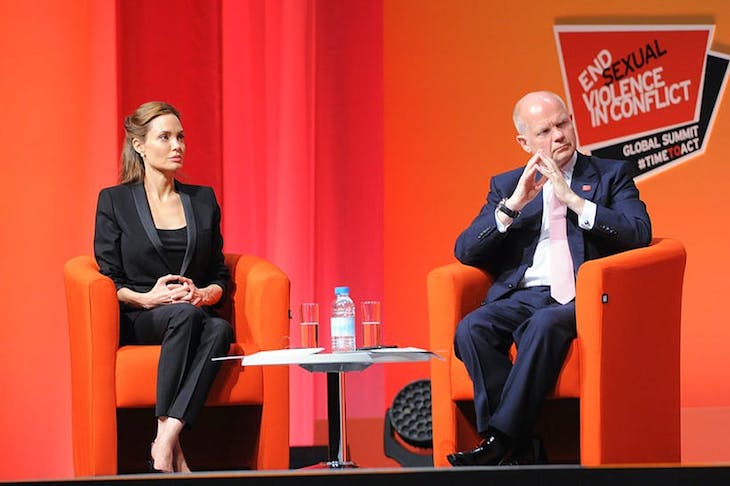If you needed an illustration of why short-termism in politics is a very bad thing, look no further than the report from the Independent Commission for Aid Impact today into the UK government’s preventing sexual violence in conflict initiative. This is more popularly known as William Hague and Angelina Jolie’s drive to end rape as a weapon of war, and garnered huge attention when the pair launched it back in 2012. Their aims were noble: to bring to justice those using sexual violence in conflict, to prevent such crimes from happening in the first place and to reduce stigma for survivors.
But the report from the ICAI on whether those aims were realised makes miserable reading. The campaign didn’t meet its objectives and may have even harmed some of the survivors it worked with.
One of the main reasons for this is that Hague didn’t remain foreign secretary for much longer after he set up the initiative. The report says that after that, ‘ministerial interest waned and the PSVI’s staffing and funding levels dropped precipitously during this time’.
There was ‘no overarching strategy or theory of change’ and work was fragmented across the three main government departments involved. Because the Foreign Office tended to fund most of the projects on a one-year basis, it was very difficult to include survivors properly or support them for the length of time that they actually needed. The report added:
‘Delays in funding and unrealistic project timelines risk doing more harm than good to survivors who embark on lengthy justice processes extending well beyond the Initiative’s one-year funding cycle.’
Some government mistakes have nebulous consequences: delayed building projects or even staff leaving a sector in greater numbers than expected. But it is difficult to think of a worse outcome to a project aiming to tackle sexual violence than inadvertently harming the very people it originally set out to help. And yet the causes of this failure are not unusual at all when it comes to UK policymaking.
Firstly, Hague’s departure as foreign secretary clearly meant that the government did not take as much interest in the initiative for as long as it should. This happens frequently: ministers are very rarely kept in post long enough to see through even important projects. In fact, many of them have left politics altogether by the time policies they introduced have fully come to fruition. Hague was unusual in that he was foreign secretary for four years, whereas many ministers are lucky if they have their feet under the same departmental desk in 18 months. It’s no way to ensure that someone understands a brief, let alone that they are able to implement their ideas and keep an eye on them.
That the initiative was subject to one-year funding cycles is hardly unusual either. In fact, a short-term approach to spending generally is the source of so many problems in politics. Quite often there are policies which would save a great deal of money, but to do so the Treasury needs to stump up extra cash to get the policy going.
Universal Credit is a classic example of that on the domestic front: those who designed it were always clear that for it to save the taxpayer billions in the long-term by getting people back into work, the government needed to spend a lot of money to set it up. Instead, UC became a convenient vehicle for cuts to benefits.
It is particularly difficult when a policy sounds like an unequivocally good thing. It is hard to argue with the aims of Hague and Jolie’s work on sexual violence, and therefore very easy to presume that the good thing is being done in the right way. Less attention is paid to Good Things in politics, with less suspicion about their design, and yet as we see in this report, Good Things can end up doing harm too.
No one meant to do harm with this project, and yet unless the flaws in the way government works change, we can be fairly confident that future ministers will end up doing more harm with other policies in a depressingly similar way.







Comments